#new year's food traditions
Text

Steven Pursley, the chef and owner of Menya Rui in St. Louis, spends the first day of the year eating yet another type of soup: Okinawan soba. The gentle broth, made from dashi and pork, is a great base for the wheat-based soba noodles commonly eaten in Okinawa, off the southern coast of mainland Japan. In America, Mr. Pursley’s resourceful mother sometimes used linguine when she wasn’t able to find Okinawan soba noodles. Now, he makes the noodles from scratch.
1 note
·
View note
Text
[Traditional Chinese Festival] Customs of 臘八節(Laba Festival) in China.Eng Sub
Today(January 18, 2024) is the traditional Chinese festival,臘八節 Laba Festival.Let’s learn about some interesting traditions and customs about this festival.
【About 臘八節(Laba Festival)】
Laba Festival (Chinese:臘八節) is a traditional Chinese holiday celebrated on the eighth day of the month of La (or Layue 臘月), the twelfth month of the Chinese calendar. It is the beginning of the Chinese New Year period. It is customary on this day to eat Laba congee.
Laba Festival was not on a fixed day until the Southern and Northern dynasties, when it was influenced by Buddhism and was fixed on the eighth day of twelfth month, which was also the enlightenment day of the Buddha. Therefore, many customs of the Laba Festival are related to Buddhism.
The Laba Festival's name represents its date on the Chinese calendar. La is the name of the twelfth and final month, and ba means "eight/八". In ancient China, the "eight/八" referred to making sacrifices to eight gods at the end of the year.
In its original form, the festival was celebrated by making sacrifices to gods and ancestors to wish for good fortune, health, safety, and a good harvest in the new year. The word la originally referred to these sacrifices.
After Buddhism spread to China during the first century CE, the festival was used as commemoration of Gautama Buddha's enlightenment.It was given a fixed date (the eighth day of the twelfth month) during the Northern and Southern dynasties.
【Customs of 臘八節/Laba Festival?】
Laba congee/臘八粥
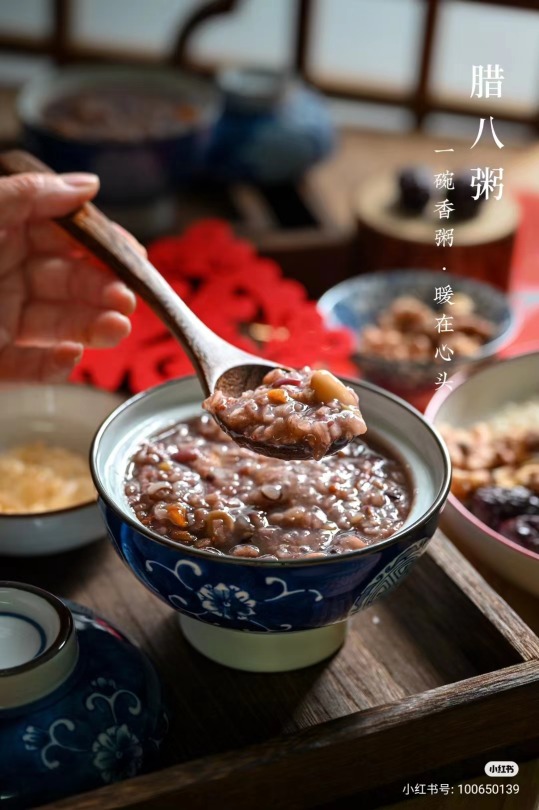
Traditionally, the consumption of Laba congee is an important element of the festival. There are multiple legendary accounts of the dish's origins. One story says that it originated in the Song dynasty with Buddhist monasteries giving congee to people in honor of the story that Sakyamuni (Gautama Buddha) reached enlightenment on the eighth day of the twelfth month after eating congee.
Laba congee or Laba porridge (臘八粥; Làbāzhōu) is very popular in many places in China. Different kinds of rice, beans, nuts and dried fruits are the main ingredients. People believe that it's good for health in the winter.
It is also known as "eight-treasure congee" (八宝粥; Bā bǎo zhōu)and is usually made with eight or more ingredients, representing good luck. Eight is a lucky number in China, and the ba in Laba also means eight.
There are many variations of Laba congee in different regions of China. Ingredients can include mixed grains, such as rice, millet, and barley; beans and nuts such as mung beans, azuki beans, lotus seeds, peanuts, walnuts, and chestnuts; dried fruit such as red dates, longan, raisins, and goji berries; and other ingredients such as vegetables and meat.
2.Laba garlic/臘八蒜
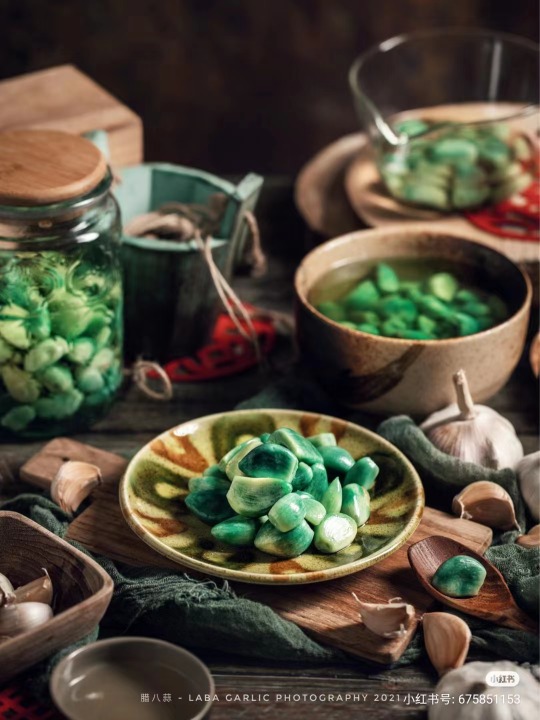
Another Laba food is Laba garlic, which is particularly popular in northern China.Garlic in Chinese (蒜; suàn) has the same pronunciation as calculate (算; suàn), and it is said that on the Laba Festival businesses should balance their books and calculate their revenues and expenditures for the year.Laba garlic is made by soaking garlic in vinegar. Laba garlic is soaked in vinegar from the Laba Festival until Chinese New Year. The garlic and vinegar are then used alongside Chinese dumplings (jiaozi) around Chinese New Year.
————————
🧚🏻Model/Makeup:@曾嚼子&@兔狲猫眠眠
📸 Photo:@逸群闲余
🔗 Xiaohongshu:http://xhslink.com/zlF8Hz
————————
#chinese hanfu#hanfu#Traditional Chinese Festival#臘八節 Laba Festival#chinese culture#chinese customs#chinese history#hanfu accessories#chinese food#china#chinese new year#song dynasty
200 notes
·
View notes
Text
"I'm not leaving you behind! It is my duty," he hissed. "I swore myself-"
"Your swore yourself because you had no choice, Percy." Her eyes were endless dark, devoid of feeling, of life. "You had a price to pay for your mother's life and this was your only offer." Her thin fingers cup his face through the bars. "You didn't choose to be my protector." She gave a weak laugh that made his stomach plummet to the floor. "You're not even my guard yet, not really."
Like a phantom, her touch slid down his cheek. He caught her wrist before her fingertip stopped gracing his skin. He could feel the rounded edge of her fingernail poke against him. Silence held fraught between them.
"Bianca-"
"Percy," she cut in, voice so sharp it cut him to the core. "I want you to survive. You're free. Take advantage of that, and go. Now."
"I can't go back without you," he said, quickly. She didn't fight his hold, but still his grip tightened. As though the harder he held her, the more she would stop protesting her escape. "You are-"
"Dead." Her lips thinned. "I'm dead, Percy. I was dead the moment they got their hands on me and I will be dead before either one of us even makes it beyond these walls, but you-" Her voice cracked, eyes watering.
He shook his head. Blood pounded in his ears. He didn't want to hear what she was going to say, wanted her to stop, wanted it all to stop. Just for a moment.
But it didn't, and neither did she. With a deep breath, she carried on, "You can make it. You can live. But only if you leave without me, so go."
His lungs burned. She inhaled so deeply, spoke so forcefully, and it made him hold the air in his chest until he couldn't take it anymore. If he didn't breathe, maybe she would. But his chest ached. Self-loathing wedged itself like a rock in his throat as he let go. The sound of his own breath was like nail on chalkboard.
"Percy," she whispered. He shook his head and leaned in closer. Although tears hadn't yet fallen, her eyes were still wet. They glistened like the night sky. Her forehead pressed against the bars.
He looked away. The brick wall to his left was growing a fair bit of moss in the corner. "What's our star again?"
She laughed. It was a watery thing that choked him where he stood. Memories of standing the long grass, moonlight shining off the river, while she read her books beside him. Every so often, she'd look up at the night sky and search for the brightest star that month. She'd tell the stories behind the constellations. Or at least the stories from her kingdom. Any time she told a story, a fantastical myth, she'd follow up that her brother knew more - Nico, the quiet prince with a voracious appetite for legends and monsters.
Then, if she could spot the brightest star that month and if she recalled, she'd tell him what it meant for the people born that month. At least, in their hemisphere anyway. The stars were different elsewhere. Sometimes she'd crack open the newspaper, the stark image of her father, and read aloud the horoscopes.
He still remembered the incredulous sound she made when he told her they shared the same birthday. She'd dragged him to the library to refresh her memory on their star. Then argued furiously that he did not share the same traits as her.
It was a silly thing. She didn't believe it. He didn't either. But it was the first time they hadn't played the stiff act of royal princess and her knight-in-training. Not Percy holding his tongue and following strictly one step behind. Not Bianca doing her best to pretend he wasn't her shadow.
Awkward civility and stiffness carried thick between them from the moment Percy had been casted into his role. But that night, with the sound of yelling and laughter still echoing in their ears, they made an agreement. They didn't have to be the best of friends, but they sure could be casual with each other. After all, they were going to be stuck with each other for the rest of their lives.
At least... they were supposed to be.
Slowly each finger detached one by one until all that was left was his palm pressed against her wrist. Then that fell away too. Still he couldn't bare to turn his head and face her.
"Leo," she said. "The lion. Strength, pride, loyalty, confidence."
A stabbed orange toy on new year's day passed through his mind. "Sacrifice."
It was quiet for a beat. Then, "Yes." His heart hammered so fast he could feel it in his throat. "The lion represents sacrifice."
What was he supposed to say? He wanted to run, to turn the lock with the key he stole, take her and run. Run far and fast. But deep inside, he knew she was right. He could get by undetected. No one cared about a child knight, not even yet passed his training. He could blend in and slip out. Even if he got caught, they wouldn't nearly put in as much effort to get him back as they would if she were with him.
She was right.
She was already dead.
He swallowed thickly and met her eyes again. The night sky glistened back at him and he thought of constellations and warm handshakes and kind agreements and silly arguments. Breath caught in his throat. "I'll miss you," he whispered, voice hoarse.
Her lips twitched. "I'll miss you too." She blinked, and one tear slid down her cheek. He tracked the wet trace it left behind until it welled up at the bottom of her chin and dripped to the floor. "Will you do me a favour?"
"You're my princess," he said. "I would do anything for you."
It was a weak smile she gave before she spoke. The sight of it crushed him. "Tell my family I love them." Her breath escaped from her shakily. She pushed back her hair. A classic move to hide the nerves that drove her hands to tremble ever so slightly. "And take care of Nico. Please."
"I will," he promised.
Her smile strengthened ever so slightly. But the tears fell fast now, one right after the other. Her face tilted away at the first streak. He immediately turned his line of sight back to the brick wall. Weakness, sadness, grief - she hated being seen with any of them. He always respected it. Look away until she was done. Don't speak, don't ask her anything, don't help her. Just look away and stay silent unless she calls out.
So, even as his mind's eye was trapped in the wet track of tears on her skin, the hitched sound of her breath holding in a cry, he turned and headed back for the dungeon's door. The doorknob twisted in his hand. The door cracked open.
"Percy."
He held stiff. "Yes?"
"Don't forget the bracelet."
Heat burned at the back of his head. In his pocket, the bracelet felt heavier than the weight of the world. When he had first arrived, she gave it to him. When he refused to take it, insistent that she could deliver it to Nico herself, she shoved it into his pocket herself. Like a ghostly stain, his thigh still tingled with the forceful and firm press of her hand. He was sure it always would.
"I won't."
"Stay safe," she said, a princess in a dungeon ready and waiting to die.
His heart shattered. Still, he kept his head held high. "I will."
Then, without another word, he left the girl he had spent the last three years training to protect. He was meant to die for her. It was the role he had accepted the night he and his friends had stormed the castle and pleaded for help with his dying mother. He didn't argue. He didn't plead. Without hesitation, he swore his life away for hers. Without hesitation, he swore his last breath would be hers.
Yet she was the one embracing the eternal coldness to come. She was the one breathing weakly so he could breathe strong. She was trading away her life for his. She was the lion, giving a mighty roar before the dawn of a new year. She was the sacrifice, held down by chains with a glistening sharp blade raised above her head.
But he wasn't the one lowering it upon her neck. No, he was the cold breath of winter. The first drop of snow. The wilting grass. He was the barren wasteland that drove her out into the open. He was the starving masses desperate to live. He didn't have to drop the blade. He didn't have to use his own hands to spill her blood across the ground. His survival was her end. And that made him her killer anyway.
#bianca di angelo#percy jackson#had this thought that was basically what if percy was bianca's bodyguard and became obsessed with protecting nico after she died#and this this happened#happy talks pjo#my writing#my fanfic#the lion leo constellation thing was spur of the moment so the whole sacrifice concept after was made up as i was going along#but anyway the thing i made up for it in this AU or whatever is that in hades' kingdom the start of the year begins with winter#so in the before times winter would come and the people would struggle but they'd be okay but one day the winter was awful#the food stores were ruined and the winter farms were weakened so people began to go hungry as they rationed the food#but the winter was so bad it also drove out the animals in the forest including a pack of lions which the people killed for meat to survive#so every new year as a tradition a lion is sacrificed as like a promise of survival and prosperity and health and whatever#a real lion is sacrificed publicly by the royal family. other people will sacrifice a placeholder like a lion toy or a painting of a lion#idk what they do with the lion after - maybe the royal family eats it or households do a lottery to get a portion of its meat delivered#could i not have just made up a separate new thing for percy's birthday month? yeah. but that would've required more effort and i'm so tire#fuuuck is it really 10pm? shit i need to eat
45 notes
·
View notes
Text

getting ready for cny😁😁😁😁😁
#been doing so much research for a bigger cny piece. its gonna have soooo many food items#anyway. more lunar new year glenn art pleaseee#also im never sure what to call it? like here chinese new year is mostly called chinese new year/cny/xin nian but internationally#and on the internet i see lunar new year and chun jie used more. (i see those on signs here but in conversation its just cny)#and like xin nian rhymes better with hot glenn than chun jie but i dont wanna use a less clear/accurate term#ive also seen people saying the close/foster family should be/speak cantonese so im not even sure if i should write the chinese#in simplified or traditional form cuz im mostly familiar w simplified#head in hands.... but i have a month to work it out so its fineeeee right
14 notes
·
View notes
Text
Shanah Tova means “good year” in Hebrew and is a customary well wish shared during Rosh Hashanah.
Rosh Hashanah – the Jewish New Year – is signified by indulging in a sweet treat. Traditionally, apples and honey have been the go-to sweet indulgence served at dinner tables for generations as they symbolize hope for the sweet year ahead. Many dip apple slices into honey on Rosh Hashanah for extra sweetness.
#hebrew#jewish#learnhebrew#hebrewbyinbal#language#hebrew langblr#israel#jew#torah#trending#new year#rosh hashanah#shanah tova#apples#honey#treat#happy new year#jewish holidays#jewish tradition#jewish food#hebrew school#hebrew bible#hebrew alphabet#hebrew language#hebrew words#hebrew israelites#jewish things#jewish history#jewish family#jewish culture
28 notes
·
View notes
Text

maslenitsa
#goodbye winter see you in half a year#russian maslenitsa is a pagan thing mashed together with ortodox christianity#mari maslenitsa is a mix of mari pagan traditions and russian maslenitsa due to the land being part of historical Russia for quite a while#what our peoples (and most peoples everywhere) agree on when it comes to holiday celebrations is “fire good” “food tasty” & “have fun” lol#also i forgot the new phone is stupid and i cannot give the drawing app the permit to save files so there's only a sceenshot :P#sketchbook and stuff#dear diary
8 notes
·
View notes
Text
.
#not to be depressing in new year's eve but i feel so shit right now...#all year i've been so out of myself not enjoying anything#and what i do manage to enjoy takes up like an hour of my life and then it becomes disappointing#that's how i would describe the past few months... disappointing#everything feels flat#I can't manage to hold on to a good feeling for more than an hour or two#i have absolutely no hope for the future and I don't even care about that anymore#nothing feels worth anything anymore#and what's really solidifying that feeling today of all days#is the fact that every year since before I was born my family celebrates new years eve#a few years ago the celebrations changed since my extended family decided to cut us out a bit but my mom brother and i still celebrate#we get yummy food play fun games and just spend the night together until midnight when we toast and go to bed#well this year it's 10:30 and we're already in bed doing the same things we do every day#being on our phones or watching a movie or whatever on our own#and it's just disappointing again#idk if it's the break of the tradition or the fact that the new year doesn't feel important this time#but i feel so fucking sad and numb and depressed#i hate it#I don't even feel like saying the usual ''hope 2024 is better'' shit#i just don't care and i don't think it's gonna be better... it's gonna be the same old shit and it's gonna be disappointing#nothing matters anymore and i don't think anyone fucking cares#i feel so numb...#i don't even know what the point of this post is... sorry about that#hope y'all's new years eve is better than mine (or new year's day idk your time zones)#angel talks#personal
7 notes
·
View notes
Text
It's New Years Eve
In Germany we have the tradition to eat "Pfannkuchen" for New Years Eve. Which are filled donuts.
I already got mine. Can't wait to eat them soon.
Do you have any traditions in your countries?
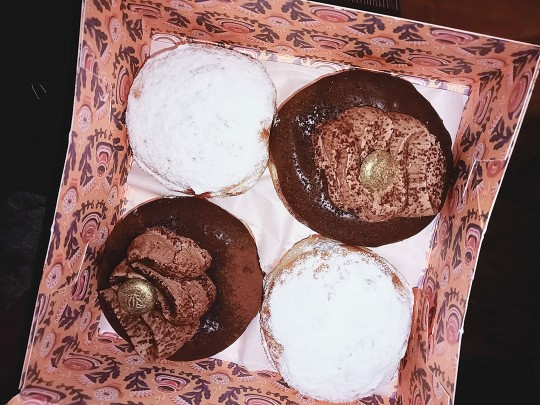
#I'm glad I pre-ordered these the line was insane. Good thing I didn't had to wait at all#new years eve#tradition#germany#my new years eve#food makes me happy#i usually don't like sweets#i only like donuts. the only sweets i occasionally can eat
45 notes
·
View notes
Text


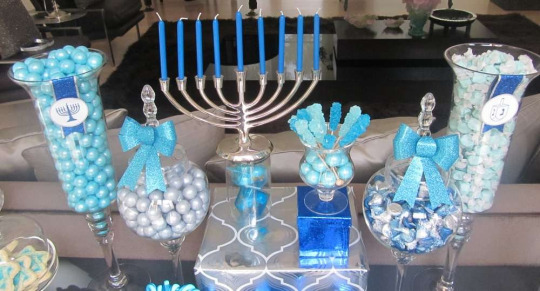

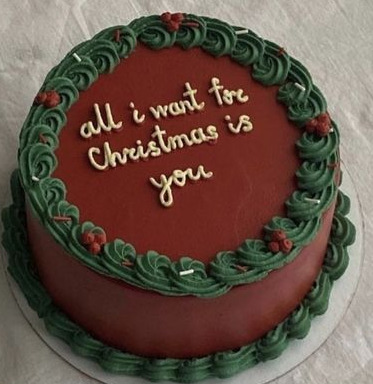

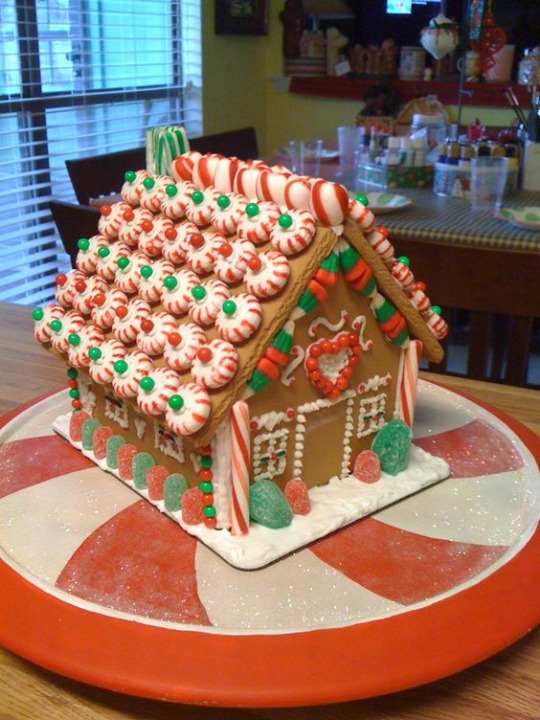

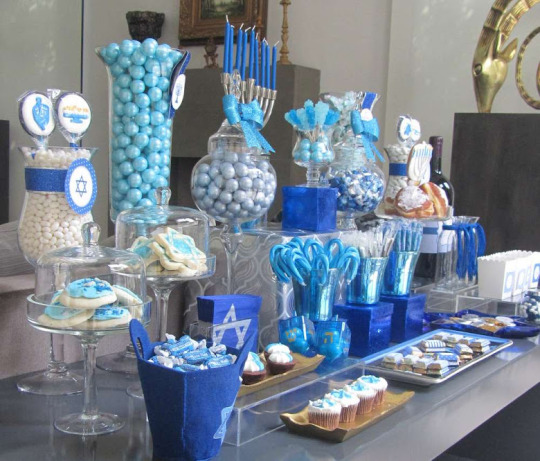

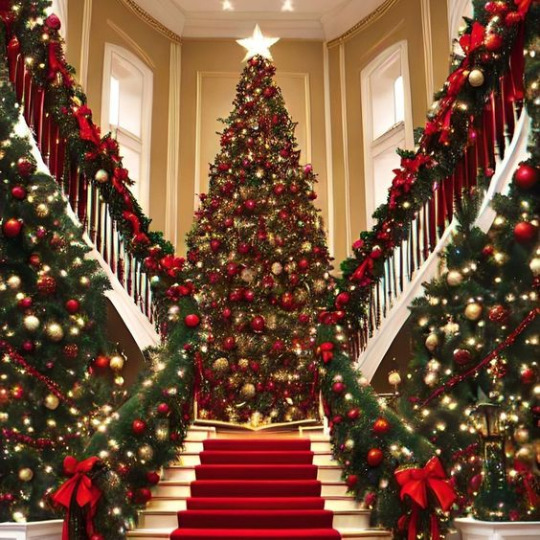




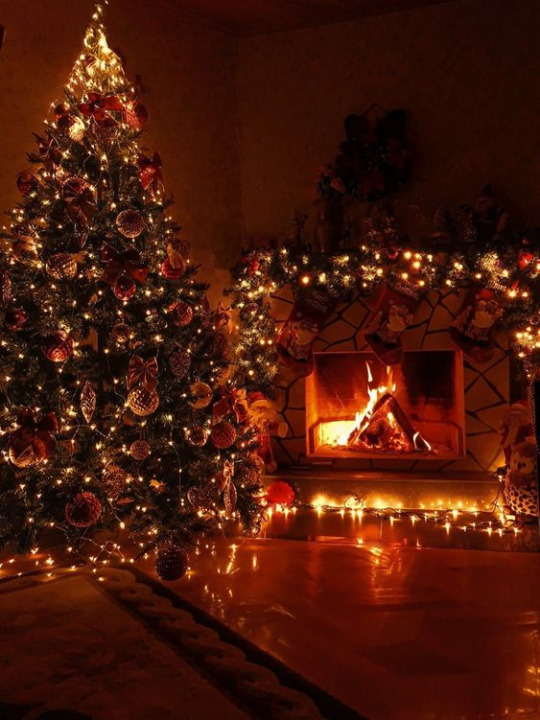
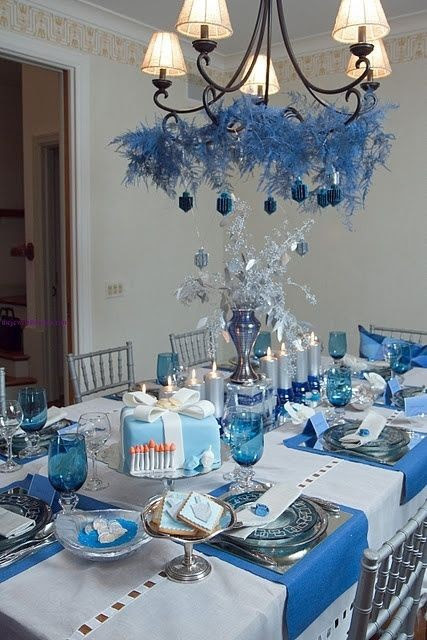
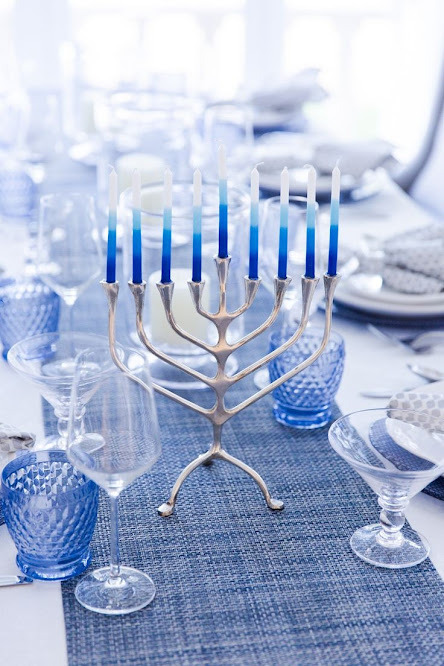

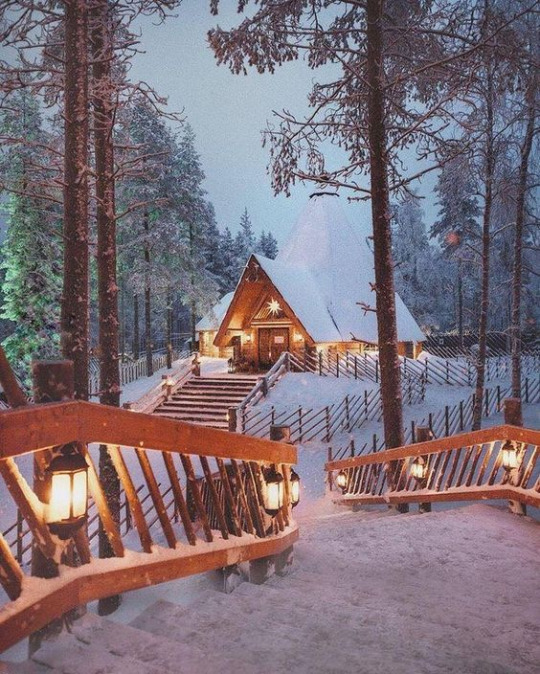
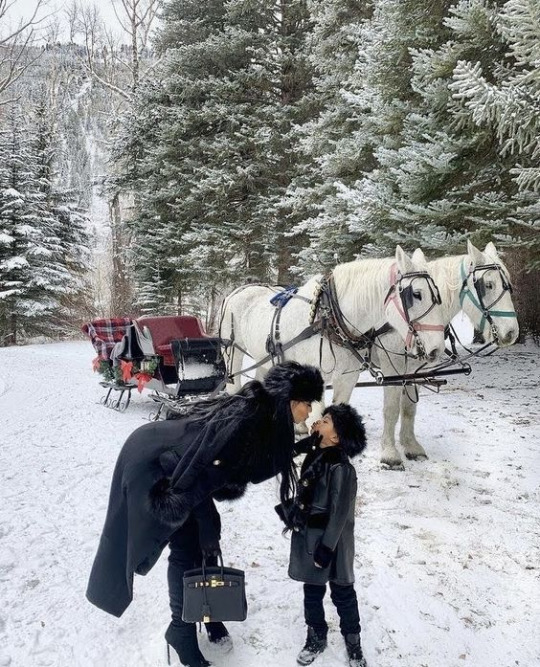

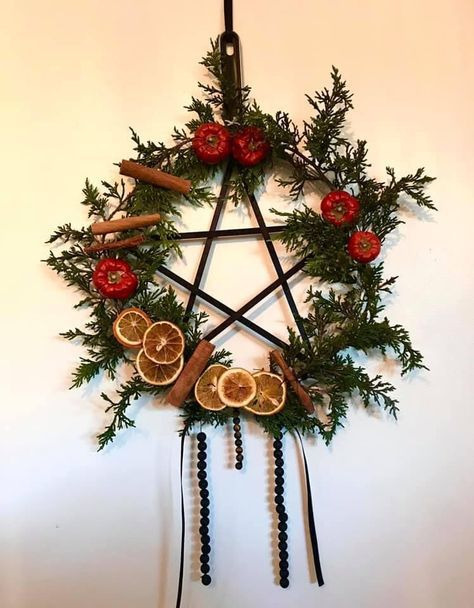

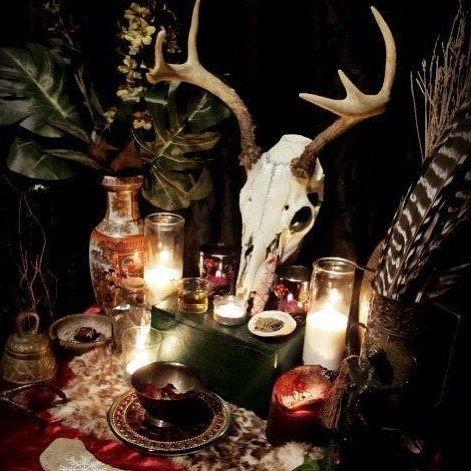
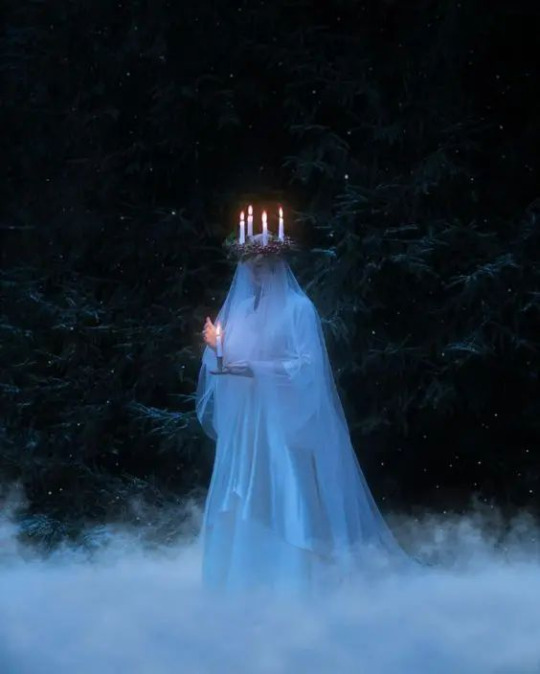


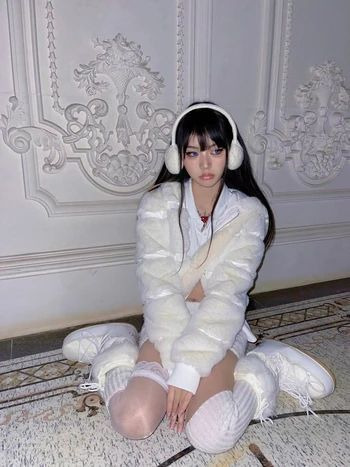

Manifestation Moodboard: Interfaith Christmas, Hannukah & Yule!!
#arcana.uploads#the idealized self.#christmas.#hannukah.#yule.#mine.#do not reblog unless you're a member of our system.#christmas + hannukah + yule inspo !! ft fancy clothes & cool stuff i'd& love to wear & do one day !! <3333#the contrasting colors of christmas / yule & hannukah are so neat tbh#like. you have red & green for christmas / yule & blue & white for hannukah w/ flecks of gold & silver for both !!#i& would totally love to have a whole hannukah thing w/ jewish friends & maybe some trusted goyim & vibe while we eat jelly donuts & challa#& study some more jewish literature & learn about revolution bc at its core thats what hannukah's about !!#& then for christmas we'd& vibe w/ friends while we drink hot cocoa & watch some cheesy movies & decorate the tree qwq + chinese food ngl#both hannukah & xmas get gingerbread houses & cakes for their respective holidays BET !!!! idc idc#& then in between xmas & yule we'd& love to go out w/ friends to like. a cabin or idk a longhouse or smth & vibe there !!#& go skiing maybe even tho i suck at it or try traditional dogsledding LAGJGAAGLJAGGALJAGJL#one of my& favorite gifts are gonna be blue roses + mullah bc we& love to see it !!#& then i'd& totally wanna go on those horseback carriage rides w/ either partner(s) or friends or maybe a future niece/nephew/nieph qwq#our& outfits would ideally SLAY#& then for yule it'll be a more quiet solemn but happy time !! bonus if it has log cake !! lots of prayers & hopes for the new year !! <333#maybe do some kinda fancy altar & practicing winter witchcraft / magick along w/ traditional indigenous medicines on the side !!#bc listen a native jewish bitch can dream !!!!
6 notes
·
View notes
Text
Feel free to rb with your answer and where you’re from/your culture/where you live (whichever you think is most fitting) if you’re comfortable :)
#happy new year :)#I’m Scottish and I know what it is#I was my grandparents’ first foot#(for those curious: first footing is the first person to visit someone’s house in the new year and you’re expected to bring something like#food or drink. so I brought my grandparents some malteasers and mini eggs because they like them and it’s what we had.#obviously more traditional choices are available but you can be creative. my brother first footed my other brother and brought him two#firework rockets. so anything goes as far as I’m concerned)
5 notes
·
View notes
Photo

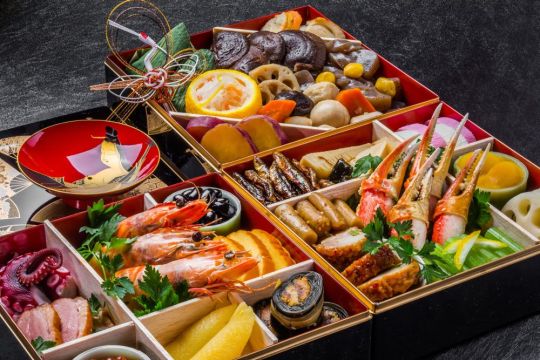
Japanese New Year Tradition: Osechi Ryōri
In Japan, starting off the New Year is more about spending time with family than it is about partying. It's a time of year when people go back to their home towns, pay their first visit to the local shrine, and sit down to some traditional food. And food doesn't get more traditional than osechi ryōri.
The tradition behind osechi ryōri (お節料理) goes back centuries, to the Heian period (794-1185). Ritual offerings of food used to be presented to the gods on sechinichi, or days that marked the changing of the seasons according to traditional Chinese almanacs that were used during this time. The most important sechinichi, of course, was the day that marked the beginning of the New Year. On this day, special dishes were offered to various deities, and also eaten by members of courtly society.
Over the centuries, these traditions made their way to the rest of society, and by the Edo period (1603-1868), they were being practiced commonly around Japan. They combined with other beliefs, notably that on the first days of the New Year, any kind of work — including cooking — was to be avoided. There are two competing theories as to why this was the case. One was that the gods shouldn’t be disturbed by the sounds of cooking on the first days of the year, and the other is simply that the beginning of the year was meant to be a time of rest, when everyone — particularly the women of the household, who did most of the work around the home in those days — could enjoy a well-deserved break.
In the beginning, osechi was quite simple food — vegetables boiled in soy sauce and vinegar — but over the centuries, more and more types of food were added to the osechi ryōri lineup, turning it into a much more elaborate affair. Almost all of these dishes have a special meaning, related either to the name of the food in Japanese or to its appearance or other special characteristics. These are some of the most commonly eaten dishes, and their associated meanings:
Kuromame (黒豆)
Black beans are meant to be a symbol of health, with the associated idea that the person who eats them will be able work hard in the year to come.
Kazunoko (数の子)
This dish is herring roe, but the symbolism is connected both to the large number of tiny eggs, and to the meaning of the Japanese words. Kazu means “number” in Japanese, and “ko” means “children.” The wish behind this item is that the next year will bring many children. For an extra layer of meaning, look to the name of the fish in Japanese: the word for herring is nishin, and if it’s written with an alternate set of kanji (二親), it means “two parents.”
Tazukuri (田作り)
This dish is sardines boiled in soy sauce. Historically, sardines were used to fertilise rice fields, and this word means “rice field maker” in Japanese. Symbolically, this food is eaten in the hopes that the coming year’s harvest will be plentiful.
Kohaku Kamaboko (紅白かまぼこ)
Kamaboko is a kind of fish cake, and kohaku means red and white. The colours represent Japan (most easily found on the country’s flag), and are generally considered to be good luck. According to some, the red colour is meant to prevent evil spirits, while white represents purity. Incidentally, Kohaku Uta Gassen is one of the most popular TV shows that Japanese people watch on New Year’s Eve, and it’s a singing competition between two teams comprising of the most popular singers in Japan — the white (male singers) and the red (female singers).
Datemaki (伊達巻)
This is an omelette mixed with mashed shrimp or hanpen (fish paste). It tastes a little bit different from the tamagoyaki that you might be used to, but it’s rolled into a similar shape, which happens to look like a scroll from the side. That’s why this particular food is associated with learning and scholarship.
Kurikinton (栗きんとん)
These are sweet dumplings that are made from chestnuts. Because they’re yellow in colour, they’re associated with gold, and eating them is meant to bring financial prosperity in the year to come.
Kobu (昆布)
This is a type of seaweed, and this word is closely connected to the word yorokobu, or happiness, which is what this food is meant to bring in the New Year.
Tai (鯛)
Sea bream; the symbolic meaning here is something of a play on words. Tai is part of the Japanese word medetai, meaning happy or joyous. This fish is often eaten on special occasions, and it’s one of the dishes that is served as okuizome, the traditional food that a baby is fed about 100 days after he or she is born. In osechi, it’s meant to bring joy and happiness in the new year.
Shrimp (海老)
The kanji for shrimp mean “old man of the sea,” playing on the sea creature’s bent back and antenna that look like whiskers. This food is meant to bring longevity.
Satoimo (里芋)
Also known as taro root, this dish is eaten in the hopes that the family will be blessed with many children — just like many small taro tubers grow off of the main tuber.
Renkon (蓮根)
Known as lotus root in English, this vegetable has very distinctive holes when it is cut in cross sections. Because you can see clearly when you look through these holes, this food is eaten in the hopes of having a future with no obstacles — or at the very least, obstacles that you can see clearly.
Just as it goes with any tradition, not every dish is eaten at every household, and some dishes fall out of favour over time – sometimes because younger people don’t particularly enjoy eating them, or because tastes change. (One newish item that you’ll find in osechi ryōri spreads, although it doesn’t have any special meaning yet, is roast beef.) The osechi dishes are, for the most part, served in elegant lacquer boxes known as jubako.
Some families prepare the osechi themselves, while others choose to order theirs from department stores or convenience stores. For those who wish to purchase a beautifully crafted osechi for their New Year’s celebrations, department stores like Takashimaya and Keio stores offer fantastic options — though they certainly don’t come cheap!
#Japanese New Year#Osechi Ryori#お節料理#Osechi#Japanese Cuisine#Sanganichi#Japanese Tradition#New Year#Osechi Ryōri#Japanese Food
34 notes
·
View notes
Text
#persian new year#nowruz#Persian New Year#Spring festival#Iranian culture#New beginnings#Traditional celebrations#Family gatherings#Festive food#Joyful occasions#Renewal and rebirth#Cultural heritage#Happiness#Reunion#Seasonal festivities#Cultural diversity
2 notes
·
View notes
Text

My new year's day dinner! 15 bean soup, rice, steamed collards, and cornbread! Tried new things. Made the rice with chicken broth and cajun season liquid (could have used more actually, but still very good). Added smoked pork neck to the soup for extra meat (an extra piece had the snout which is probably equally lucky for this purpose as it was disturbing. Extra meat is in the freezer. Not going to eat the nose though). I've also never cooked collards, but it was simple enough. Steamed it instead of cooking it for hours with bacon as tradition dictates. I never ate the bacon anyway and it's probably healthier. Mostly, it was quicker and I could cook it over my rice with a little basket that came with my cooker.
The cornbread might kill me, but it tasted great. The egg expired back in November, but it looked and smelled fine. The cornbread was dated 2022, but it's Jiffy, which I don't believe actually expires. Just got to make sure it doesn't have bugs.
4 notes
·
View notes
Text
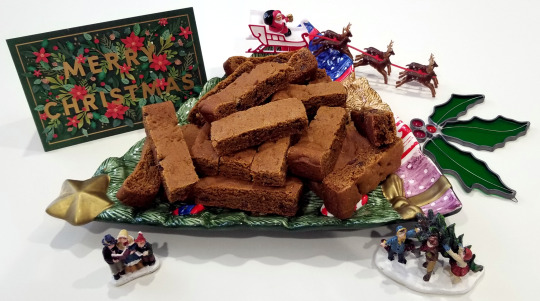
My grandmother's recipe for Hermit Cookies, a traditional New England spice cookie in the same genus as Joe Froggers and Black Cake.
Directions in North American customary units: online conversions are available but give some very different values for how many grams of raisins to a cup and grams of salt to a teaspoon, etc. The dough is very stiff and must be pressed into the pan, if it's too dry and crumbly add a little more shortening and molasses.
Preheat oven to 350°F.
⅔ cup shortening
1½ cups golden brown (light brown) sugar, packed
2 eggs slightly beaten
1 cup raisins
2 generous tablespoons molasses
1 teaspoon baking soda
1 heaping teaspoon cinnamon
1½ teaspoons cloves
1½ teaspoons nutmeg
½ teaspoon salt
2½ cups all purpose flour
Mix ingredients in the order given. Spread into a large pan (n.b. I use a 10″ x 14″/25cm x 35cm pan) and bake for 20-25 minutes, until just done. Cookies will be soft. I grease the pan with butter, the original recipe does not call for a greased pan and my sister makes them in an ungreased pan. Cut into squares or bars after cooling.
#cooking with shaun#hermit cookies#new england#traditional recipes#recipe#food#baking#cookies#spice cookies#family recipes#hermits#i tried shaping the dough with a rolling pin this year#but it's too sticky#you really have to press it into the pan like play-dough#it will rise#eta: fixed typo
26 notes
·
View notes
Text
if you are like me and are uncultured, here's some stuff about Chinese new year I got from chatgpt (i know some people hate it, but i find it useful under certain circumstances)
for those of you who are as uncultured as I am, may I present to you the major celebrations, cultural significance, and the popular foods/activities of the Chinese new year

Chinese New Year, also known as the Spring Festival, is the most significant traditional Chinese holiday celebrated at the turn of the traditional lunisolar Chinese calendar. It typically falls between January 21st and February 20th, marking the beginning of a new lunar year. The festivities usually last for about 15 days, with each day carrying its own significance and customs.
Major Celebrations:
Family Reunion: Chinese New Year is primarily a time for family gatherings, where people travel long distances to reunite with their loved ones. The emphasis on family reflects the importance of unity and filial piety in Chinese culture.
Spring Cleaning: Before the New Year, houses are thoroughly cleaned to sweep away any bad luck and make room for good fortune to enter.
Decorations: Red is the dominant color, symbolizing good luck and happiness. Homes and streets are adorned with red lanterns, couplets with auspicious phrases, and images of the upcoming zodiac animal.
Fireworks and Firecrackers: Loud noises from fireworks and firecrackers are believed to scare away evil spirits and bad luck, ushering in the New Year with joy and prosperity.
Dragon and Lion Dances: Performances featuring dragon and lion dances are common during Chinese New Year parades and celebrations. These dances are believed to bring good luck and ward off evil spirits.
Temple Visits: Many people visit temples to pray for good fortune, health, and prosperity in the coming year.
Cultural Significance:
Renewal and Rebirth: Chinese New Year signifies a fresh start and the beginning of spring, symbolizing renewal and the opportunity for personal and professional growth.
Honoring Ancestors: Ancestor worship is an essential aspect of Chinese culture, and during the New Year, families pay respects to their ancestors by offering prayers and burning incense.
Warding Off Evil Spirits: Many customs, such as hanging red decorations and setting off firecrackers, are believed to drive away evil spirits and ensure a harmonious and prosperous year ahead.
Well-known Traditions and Their Significance:
Red Envelopes (Hongbao): Adults give red envelopes containing money to children and unmarried adults to impart blessings and good fortune.
Dumplings: Making and eating dumplings symbolize wealth and prosperity because their shape resembles ancient Chinese gold ingots.
Nian Gao (Sticky Rice Cake): Eating nian gao symbolizes progress, growth, and achieving new heights in the coming year.
Spring Festival Gala: Watching the annual Spring Festival Gala on television is a tradition for many Chinese families, featuring various performances and skits to welcome the New Year.
Popular Foods and Activities:
Noodles: Long noodles symbolize longevity, so eating noodles during the New Year is believed to bring a long and fulfilling life.
Fish: Serving fish represents abundance and prosperity. The Chinese word for fish (鱼, yú) sounds like the word for surplus, symbolizing an increase in prosperity.
Tangyuan: These sweet rice balls symbolize family togetherness and unity.
Visiting Relatives and Friends: Making visits to relatives' and friends' homes is customary during Chinese New Year to exchange blessings and well-wishes.
#chinese new year#fic research#learning#chatgpt#cultural significance#food#don't @ me#did you know that chatgpt didn't pass the Turing Test?#lunar new year#traditions#holidays#culture#ideas#fic ideas#ideas for future references
3 notes
·
View notes
Text
My uber Pentecostal aunties; We aren't superstitious, we believe in the Lords Will.😌
Then why is the church serving the SPECIFIC meal of Black Eyed Peas, Collard Greens and Cornbread before the midnight service???🤔🤨
#black culture#black community#Black food culture#Black traditions#happy new year#Pentecostal#christian faith#spirituality#it is okay to admit we got deep cultural traditions auntie#i promises its okay
21 notes
·
View notes